Prostatitis is an inflammation of the prostate gland that affects men 20 years of age and older.
According to statistics, 1 out of 4 men has had this disease in one form or another. In recent years, there is a nagging trend to "rejuvenate" the process. This is due to sexual distraction, an increase in sexually transmitted infections, a tendency to self-diagnose and treat on the Internet, and infectious agents' resistance to the activity of sexually transmitted infections. antibiotic therapy.
This is especially true because the first signs of prostatitis in men, as a rule, are shown to be erased, do not allow the doctor to consult in a timely manner and in some cases lead to a rash. progression of advanced prostatitis.
Signs identify prostatitis in men
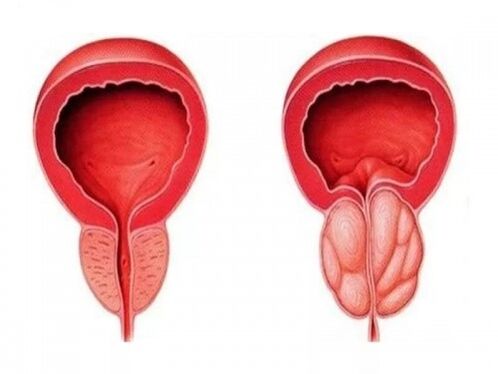
The characteristics of the structure, blood supply and position of the prostate gland affect the nature of the symptoms that lead to its inflammation. Including:
- Pain symptoms.
- Symptoms of a urination disorder (indigestion).
- Symptoms of erectile dysfunction.
Pain symptoms
Pain sensations, of varying intensity, bother men in the lower abdomen, in the perineum, genitals, spine. This painful site is caused by the presence of nerve connections and the involvement of the seminal vesicles (seminal vesicles) in the inflammatory process.
Pain can vary in intensity, from inexplicable discomfort to intense pain that affects a man's mental state and causes insomnia. Pain is dependent on sexual behavior and arises from not ejaculating frequently, or vice versa, during ejaculation. involves the spread of the inflammatory process on the posterior urethra.
Note that pain in the ear canal may not be related to the prostate gland in any way, but may result from, for example, bone necrosis of the spine. The results of the conversation with the patient and the urinary examination data help to establish the cause of the pain.
The first sign of prostatitis in men is pain in the testicles (scrotum area) and spread along the epididymis (right and left groin areas). Prostate pain may appear on the inner thighs and back. This indicates the need to consult a neurologist to rule out neuropathy, since exactly for prostate pain, such spread is not typical.
In some cases, irradiation of asymmetric pain sensations, may suspect an inflammatory process in the prostate gland, localized in one of its lobes. At the place of manifestation, the pain syndrome is divided into the genitals (in the genital area, characteristic of congestive chronic prostatitis), exogenous (above the genital organs), characteristic of inflammationProstate progression severe) and mixed (chronic prostatitis).
Symptoms of difficulty urinating or urination disorder with prostatitis
Urinary disorders are manifested by false desires, a feeling of incomplete bladder emptying accompanied by repeated urination, which is associated with inflammation of the bladder neck and urethra. The long-term signs of dysuria in prostatitis indicate the chronic nature of the process.
Erectile dysfunction with prostatitis

Erectile dysfunction in prostatitis is manifested by premature ejaculation, blurred feeling when orgasm, decreased libido, impaired erection ability. A man's prostatitis can sometimes be suspected due to a lack of morning erection.
Decreased potency, which is the first sign of inflammatory prostatitis in men, is caused by a decrease in the synthesis of testosterone (male sex hormone).
Prostate inflammatory disease manifestations are not limited to these 3 symptoms. Usually, the first sign of prostatitis in men is the secretion of prostate fluid from the urethra during defecation (increased secretion of the prostate gland), indicating a decrease in duct muscle tone. ejaculation.
In addition, one cannot help but focus on the psychological signs of prostatitis in men: neurasthenic syndrome that develops from the nervous system (depression, fatigue, unwillingnesswhatever, body weakness).
The first signs of acute prostatitis
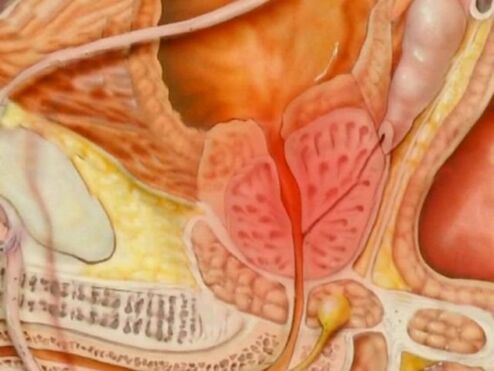
All of the above symptoms are typical of chronic inflammation in the prostate gland, with acute prostatitis in men, somewhat different picture.
The disease begins with acute excruciating pain in the epithelium, with more pronounced urinary disorder symptoms. There is an increase in temperature up to 38-39 degrees C, chills, weakness, sweating, muscle and bone pain. When defecating, pain in the anus makes the patient anxious. No sex life.
Without timely examination and no treatment, the acute process will turn into purulent prostatitis, abscesses leading to emergency surgery.
If there is no other reason (immunodeficiency state, accompanying severe pathology, etc. ) - purulent prostatitis in men - an advanced inflammatory process due to the inability to reach a doctor in time!
Significant causes of prostatitis
Factors influencing prostatitis are defined into 3 groups.
Non-responding factors include:
- Body type.
- Sexual constitution.
- Age factors.
- Presence of diseases.
- Environment (climatic factors).
Factors that can be partially controlled:
- Sexual habits.
- Job.
- Background diseases of the male genitals.
- Attitudes towards illness.
And finally, the factors that can be controlled:
- Sexual life.
- Alcoholism.
- Failure to comply with treatment recommendations.
- Error in power supply mode.
Who is at risk
Prostatitis threatens men:
- Adhere to a sedentary lifestyle.
- Chronic constipation.
- Have a history of venereal infection.
- Have more than one sexual partner.
- Being addicted to alcohol, drug addiction.
- They operate in cold conditions.
If there are signs of prostatitis, what to do
Laboratory diagnosis of prostatitis
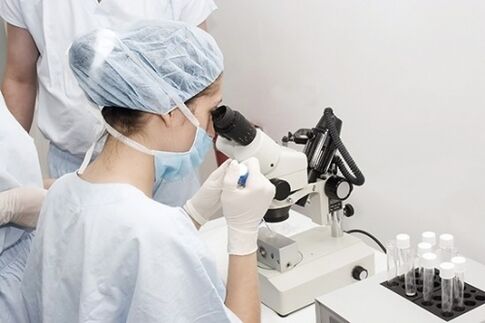
- In KLA, the erythrocyte sedimentation rate increases, the leukocyte formula changes to the left. In OAM - leukemia, proteinuria, bacteriuria.
- HIV-infected blood.
- A stain from the urethra on the flora. As a rule, in smears, leukocytes are complete. If the venereal pathogen cannot be identified (Neisser gonococcus, Trichomonas), then PCR diagnosis is required.
- Prostate secretion. Sow prostate secretions on pathogens and determine susceptibility to antibiotics.
- PCR - diagnosis of sexually transmitted diseases. The fastest and most reliable way to verify the pathogen.
- Blood for PSA Should not be drawn blood for PSA (prostate specific antigen) during acute prostatitis, the result will be unreliable. It is preferable to perform this analysis 1 month after the end of treatment. Children under 30 years of age do not need to have PSA levels in their blood checked. This test is important for men over 40 years old, as acute prostatitis can, in some cases, be secondary and a malignant tumor in the prostate gland is obscured. behind its clinical manifestations.
Tool diagnostic method
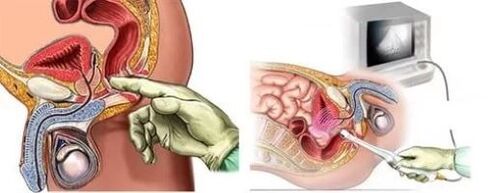
As a rule, an ultrasound examination of the prostate gland through the rectum (through the rectum) or through the abdomen (through the abdomen) is sufficient.
Signs of prostatitis on ultrasound
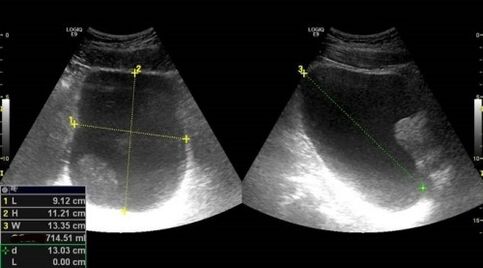
Increased gland volume, changes in texture, edemawith purulent prostatitis - necrotic areas, deformation of the contours, an increase in regional lymph nodes.
What you should pay attention to
First of all, to get rid of the symptoms of prostatitis forever, you must follow a certain diet.
Exacerbation of prostatitis in men depends on food irritants: hot spices, vinegar, pickles, alcohol.
There should be special mention of alcohol, even the minimal use of it can counteract long-term complex therapy.
Some patients feel that they should drink less often or switch to lighter alcoholic beverages. This is their main mistake.
Diluted vinegar, kvass, citrus fruits, sauerkraut, tomatoes and cucumbers have no prostatitis effect.
Eating foods rich in fiber will relieve constipation in men - one of the main reasons leading to the development of obstruction in the small pelvis.
Herbal medicine is a good support for prevention. Use herbal diuretics: Moringa leaves, cumin seeds, urinary plants to help improve urination when inflamed.
Sports, especially exercise, improves blood circulation in the pelvic organs, helping to keep the prostate gland functioning properly.
The development of inflammation in the prostate gland causes hypothermia. In winter, wear warmer clothes, and in the summer, after swimming, don't let your swimwear stay wet for long.
Using a condom while having sex with an unfamiliar partner will protect you from sexually transmitted diseases, including HIV infection.
Prolonged fatigue has a negative effect on a man's immune system, as well as stressful situations, which can intensify a latent infection in the prostate gland. Regular preventive examinations by urologists will help maintain the health of men.



























